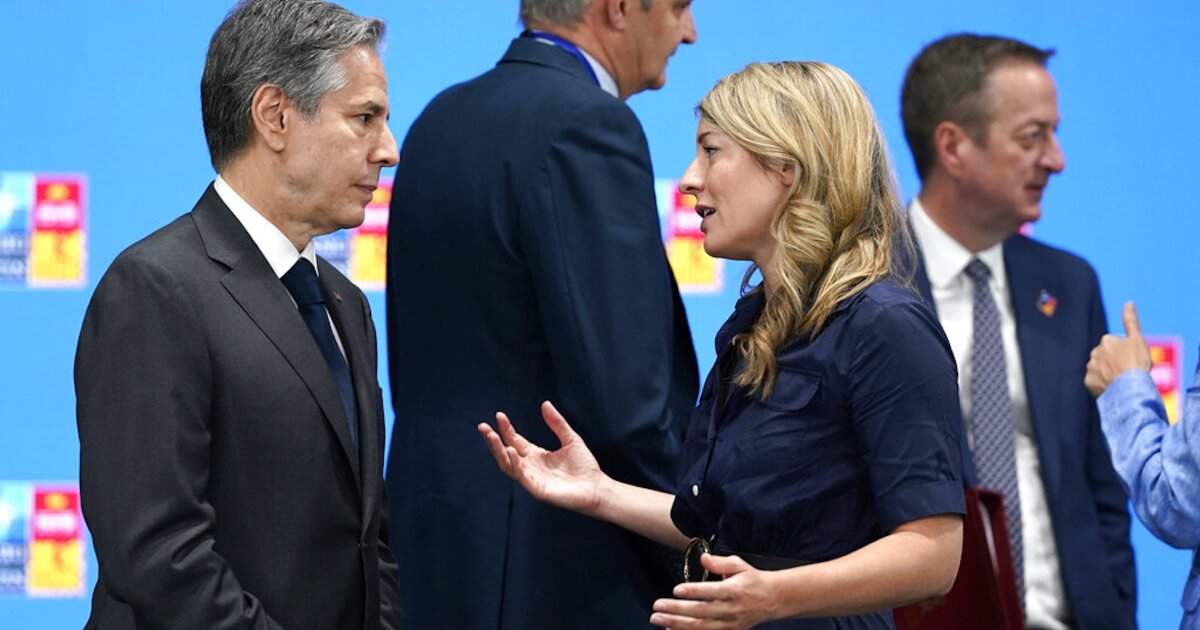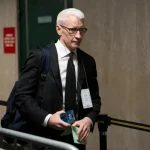

Russian President Vladimir Putin has no interest in negotiations to end the war in Ukraine, trans-Atlantic officials say.
Kremlin officials have accused Ukrainian President Volodymyr Zelensky of scuttling peace talks earlier this year, though Russian officials more recently demanded a total surrender by Ukrainian troops. A missile strike on a Ukrainian shopping mall, which coincided with the G-7 summit and eve of the NATO summit, sharpened the perception of Russian intransigence.
“It’s a signal that on the other side, on Vladimir Putin’s mind, the idea of a dialogue, even of a ceasefire, is very, very far [away],” Spanish Foreign Minister Jose Manuel Albares said Wednesday. “We all agree that dialogue would have been the best way to discuss anything, but unfortunately, Vladimir Putin doesn’t agree with us.”
Secretary of State Antony Blinken, who appeared at the NATO Public Forum event alongside Albares, echoed the Spanish envoy’s assessment that Putin ignored opportunities to avert a war by negotiating with NATO.
RUSSIA TO PLACE NUCLEAR-CAPABLE MISSILES IN BELARUS
“There was a fiction that Vladimir Putin tried to advance that this was somehow about a threat that NATO posed to Russia or that Ukraine posed to Russia,” Blinken said. “What this is about is Vladimir Putin’s conviction that Ukraine does not deserve to be a sovereign, independent country … and unless and until he gives up on this fixation on trying to end Ukraine’s sovereignty and independence, it’s going to be hard to get anywhere.”
Putin’s government, which has concentrated its forces in eastern Ukraine since the defeat of Russian forces in the battle of Kyiv, demanded a total surrender from Ukraine earlier this week. “The Ukrainian side can end all this before the end of this day; an order is necessary for the nationalist units to lay down their weapons, an order is necessary for the Ukrainian military to lay down their weapons; and they must fulfill all Russia’s demands,” Kremlin spokesman Dmitry Peskov said. “Then everything will be over before the day ends.”
Russia issued a parallel set of demands while amassing Russian forces around Ukraine before the invasion. One track centered on inducing Zelensky to agree to a revision of the Ukrainian Constitution that would have given Russian-controlled proxies a privileged place in Ukraine’s political system, while the other Russian initiative attempted to require the United States and Western European members of NATO to contract their military relationship with central and Eastern European states that joined the alliance after 1997.
“They see Lithuania, for example, not as a member of your alliance but as a republic of the Soviet Union,” Zelensky told the NATO leaders in a virtual appearance. “For us, it is an independent state and has long been a former republic of the USSR. For us, it is the past, and they see it as a possible future. They want to enslave it again … and the same goes for every country that is Russia’s neighbor.”
That statement was an apparent reference to a dispute festering over the last week between Russia and Lithuania, which announced that Russia would not be permitted to ship certain commodities along rail lines that link mainland Russia to Kaliningrad. The Baltic state maintains that this restriction is being imposed pursuant to European Union sanctions, but a former Russian general who is now a member of parliament in Putin’s party responded by outlining a proposal to attack Lithuania and establish control of a land corridor to Kaliningrad.
“And it does not want to stop in Donbas or somewhere in the south of Ukraine — it wants to absorb city after city, all of us, and then all in Europe, whom the Russian leadership considers its property, not independent states,” Zelensky said. “This is Russia’s real goal. The question is who is next for it? Moldova? Or the Baltic countries? Or Poland? The answer is all of them.”
Albares didn’t concur with Zelensky’s point explicitly, but he stated that the alliance’s perception of the danger posed by Russia “changed dramatically” with the launch of the campaign to overthrow the Ukrainian government.
“It was also a threat to us,” the Spanish foreign minister said. He concluded later by emphasizing that the range of possible “threats … can transform” based on NATO’s actions.
CLICK HERE TO READ MORE FROM THE WASHINGTON EXAMINER
“The real challenge for us is to keep united and to keep the cohesion,” he said. “If we do it — we are showing it concerning the Russian threat — we will always overcome whatever happens. If we start to have divisions and to try to get different approaches, then even very small challenges can be very, very disruptive for us.”







